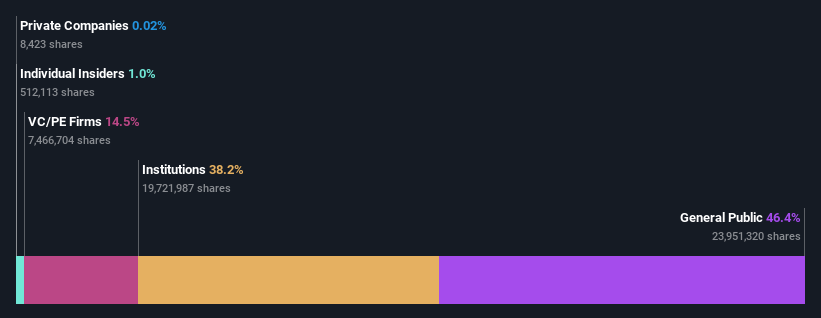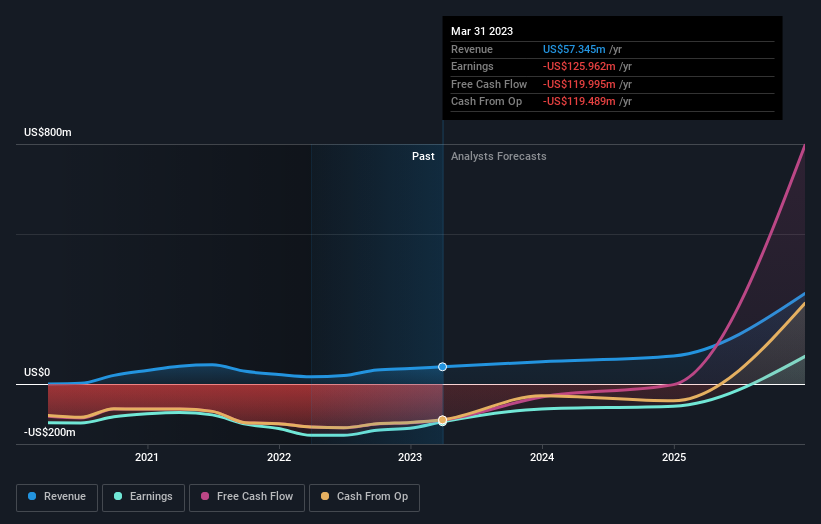G1 Therapeutics, Inc.'s (NASDAQ:GTHX) top owners are individual investors with 46% stake, while 38% is held by institutions
Key Insights
Significant control over G1 Therapeutics by individual investors implies that the general public has more power to influence management and governance-related decisions
The top 25 shareholders own 46% of the company
If you want to know who really controls G1 Therapeutics, Inc. (NASDAQ:GTHX), then you'll have to look at the makeup of its share registry. We can see that individual investors own the lion's share in the company with 46% ownership. That is, the group stands to benefit the most if the stock rises (or lose the most if there is a downturn).
Meanwhile, institutions make up 38% of the company’s shareholders. Generally speaking, as a company grows, institutions will increase their ownership. Conversely, insiders often decrease their ownership over time.
Let's delve deeper into each type of owner of G1 Therapeutics, beginning with the chart below.
View our latest analysis for G1 Therapeutics
What Does The Institutional Ownership Tell Us About G1 Therapeutics?
Institutional investors commonly compare their own returns to the returns of a commonly followed index. So they generally do consider buying larger companies that are included in the relevant benchmark index.
G1 Therapeutics already has institutions on the share registry. Indeed, they own a respectable stake in the company. This can indicate that the company has a certain degree of credibility in the investment community. However, it is best to be wary of relying on the supposed validation that comes with institutional investors. They too, get it wrong sometimes. When multiple institutions own a stock, there's always a risk that they are in a 'crowded trade'. When such a trade goes wrong, multiple parties may compete to sell stock fast. This risk is higher in a company without a history of growth. You can see G1 Therapeutics' historic earnings and revenue below, but keep in mind there's always more to the story.
Hedge funds don't have many shares in G1 Therapeutics. Looking at our data, we can see that the largest shareholder is Eshelman Ventures, LLC with 8.7% of shares outstanding. In comparison, the second and third largest shareholders hold about 5.7% and 5.3% of the stock.
On studying our ownership data, we found that 25 of the top shareholders collectively own less than 50% of the share register, implying that no single individual has a majority interest.
While it makes sense to study institutional ownership data for a company, it also makes sense to study analyst sentiments to know which way the wind is blowing. There are a reasonable number of analysts covering the stock, so it might be useful to find out their aggregate view on the future.
Insider Ownership Of G1 Therapeutics
The definition of company insiders can be subjective and does vary between jurisdictions. Our data reflects individual insiders, capturing board members at the very least. Management ultimately answers to the board. However, it is not uncommon for managers to be executive board members, especially if they are a founder or the CEO.
Insider ownership is positive when it signals leadership are thinking like the true owners of the company. However, high insider ownership can also give immense power to a small group within the company. This can be negative in some circumstances.
Our information suggests that G1 Therapeutics, Inc. insiders own under 1% of the company. It appears that the board holds about US$1.2m worth of stock. This compares to a market capitalization of US$122m. We generally like to see a board more invested. However it might be worth checking if those insiders have been buying.
General Public Ownership
With a 46% ownership, the general public, mostly comprising of individual investors, have some degree of sway over G1 Therapeutics. This size of ownership, while considerable, may not be enough to change company policy if the decision is not in sync with other large shareholders.
Private Equity Ownership
Private equity firms hold a 14% stake in G1 Therapeutics. This suggests they can be influential in key policy decisions. Sometimes we see private equity stick around for the long term, but generally speaking they have a shorter investment horizon and -- as the name suggests -- don't invest in public companies much. After some time they may look to sell and redeploy capital elsewhere.
Next Steps:
It's always worth thinking about the different groups who own shares in a company. But to understand G1 Therapeutics better, we need to consider many other factors. Consider risks, for instance. Every company has them, and we've spotted 2 warning signs for G1 Therapeutics you should know about.
If you are like me, you may want to think about whether this company will grow or shrink. Luckily, you can check this free report showing analyst forecasts for its future.
NB: Figures in this article are calculated using data from the last twelve months, which refer to the 12-month period ending on the last date of the month the financial statement is dated. This may not be consistent with full year annual report figures.
Have feedback on this article? Concerned about the content? Get in touch with us directly. Alternatively, email editorial-team (at) simplywallst.com.
This article by Simply Wall St is general in nature. We provide commentary based on historical data and analyst forecasts only using an unbiased methodology and our articles are not intended to be financial advice. It does not constitute a recommendation to buy or sell any stock, and does not take account of your objectives, or your financial situation. We aim to bring you long-term focused analysis driven by fundamental data. Note that our analysis may not factor in the latest price-sensitive company announcements or qualitative material. Simply Wall St has no position in any stocks mentioned.
Join A Paid User Research Session
You’ll receive a US$30 Amazon Gift card for 1 hour of your time while helping us build better investing tools for the individual investors like yourself. Sign up here




